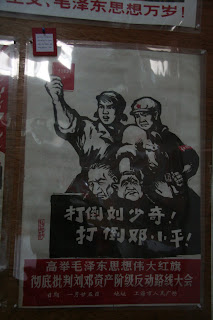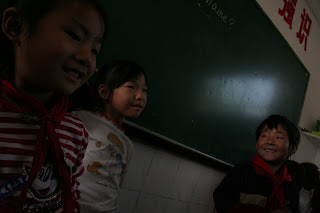
Xinjiang is a wild, beautiful, fascinating place whose apparent multiple-personality disorder only makes it more intriguing.
It's also surprisingly hospitable to ignorant weiguoren who can't speak the language.
Um, not that I would know, or anything.

China's northwestern frontier is a vast landscape of desert and mountains, and has never been as fully absorbed into the main country as most other provinces. Its Muslim Uyghurs are the most prominent of the 13 ethnic minorities who live there. They used to comprise the majority of Xinjiang's population but now make up about half the province's 20 million people--the result of successful programs to move Han Chinese into the region as Beijing pumps economic development programs into the province, and pumps oil out of it.
Travelling through Xinjiang feels a bit like inhabiting two parallel universes: Each place has two names--one Uyghur and one Chinese--so if you go to the Han receptionist at a bus station and tell her you want to go to Bourtela, she looks at you with total incomprehension until a passerby takes pity on you and gets you a ticket to "Bole." If you ask a Uyghur minibus driver if he can take you back to Yining, he gives you a dirty look and drives off, leaving you stranded until you find someone who will take you to "Gulja."

Even more perilous is telling the time: Although officially Xinjiang, like every other Chinese province, is on Beijing time, locals are on "Xinjiang time," which is two hours earlier. This kind of makes sense--the distance is farther than that between Vancouver and Toronto--but throws you off completely because all the bus and train stations will run on one time, and taxis, restaurants and stores will have something completely different. Because my sense of time is total crap, I spent much of the week feeling like I was stuck in a time warp.


I arrived in Urumqi (Wulumuqi in Chinese) Sunday afternoon, fresh off the train and completely disoriented. I remained so for most of my time there (well realistically I was pretty disoriented the entire week. But who's keeping track?).

The bustling provincial capital is more of a 21st-century metropolis than a sixth-century Silk Road trading post, but it's still a major hub of commerce.
Except now, the major structures are Chinese banks and office buildings for
petrochemical companies--the bazaars, with skinned dead goats strung upside-down alongside carts of raisins and stacks of metal pots, are still around but off the main streets. Both the petrochem CEOs and the goat-sellers have cell phones.
Almost all the signs here are bilingual--in Chinese and Uyghur, a Turkic language whose writing looks a lot like Arabic--and many are trilingual: The far north and west of the province are home to sizable Kazakh and Mongol minorities, and many of the signs are in Mongolian, as well. Some of the more ritzy touristy places had Russian-language signage. I of course understood none of this, and my ability to read Chinese-language street signs grew immensely. So did my tolerance for being extremely lost for long periods of time.

From Urumqi I went to Gulja (Yining in Chinese) via sleeper bus, which was an exercise in uncomfortable insomnia: I made the mistake of getting a top bunk, which is cheaper but which means even someone as godawful short as myself doesn't have enough headspace to sit up. I spent most of the 12-hour ride listening to the snores of my fellow passengers and peering out the window across the aisle at distant lights of mystery municipalities.

Luckily the squeaky contraption made pit stops every couple of hours so I could stagger off, dance around in the cold night air, take photos of the nearby gas station and pretend I has as much street cred as the Uyghur men who stood around smoking.
Gulja is a lot prettier than Urumqi, and a little less harried-feeling. It's also a telling product of Beijing's plan for large-scale western development, which has brought foreign investment and business from Inner China pouring in. The city's divided almost in half at the bus station: On one side is the modern, upscale new neighbourhood, populated primarily by Han Chinese; on the other is the older area, where most of Gulja's Uyghur population lives. Although Gulja's economy has grown by leaps and bounds over the past decade, some Uyghurs say they aren't benefitting from the boost, and are just hit by higher prices thanks to inflation.

Gulja/Yining was the site of violent riots in 1997, when Uyghur and Kazakh separatists took to the streets in clashes that killed several people while wounding dozens more. More than a decade later, the modernizing city still bears some of the scars from the ensuing clampdown: Extreme security measures are still in place and some Uyghur residents I spoke with say they still feel like suspect terrorists by default--especially since the attacks in western Xinjiang around the Olympics this year.

Just a few minutes outside the city centre, traditional Uyghur houses--rooms surrounding an open courtyard, with doors featuring traditional painting and metalwork--line an unpaved road, their courtyards overflowing with corn spread out to dry, often covered with a tarp to keep the household goats from getting to them.
When I was there everyone was celebrating Eid--visiting each other and, in the men's case, going to mosque and to the cemetery to pay respects to deceased relatives (the cemeteries here are separate, too). Beijing has been keeping a much closer eye on religious activity in Xinjiang since the August attacks, and people here aren't sure when stricter restrictions on things like mosque attendance and religious practice by public officials will be lifted.

There's a definite aura of mutual distrust between Uyghur and Han here--there's little mixing, and what interactions there are seem coloured by the expectation on both sides that they're in danger of being ripped off or somehow betrayed. It's very strange.
From Gulja/Yining, it's an eight-hour bus ride through the Tian Shan mountains to Bourtela/Bole. The bus winds along a precarious, dirt-and-stone road, passing construction workers building a wider paved road that will tunnel through the mountains when it's finished (I think it's a testament to my distinctly Canadian brand of racism that whenever I see Chinese people building major transportation routes through mountain ranges under questionable safety and working conditions, I think of the Canadian Pacific Railway. Yeah, I'm an terrible person).

We passed Sayram Lake, a gorgeous and impossibly blue body of water near Bourtela/Bole. I had time to run out, take a photo and prance around before the bus left without me and I had to chase it down or be left with the yurts, bulldozers and tourist stand.
Bourtela and Oursan/Wenquan, which is apparently famous for its really boring hot springs, weren't super interesting. But getting to and from the cities was an experience and a half, which kind of encapsulates what the entire trip was like.

The area southeast of Urumqi is another world altogether--oil derricks and windmills dot the desert landscape, and the crazy rock formations of the Flaming Mountains look like something out of a film set (in fact, part of Crouching Tiger, Hidden Dragon was shot there and people go tour the former set. Cool).
The towns around Turpan are famous for their grapes and their cotton--and, now, their oil. The two industries don't go terribly well together, and a lot of farmers are worried they're being pushed out as their land is bought up for oil exploration and extraction.
Sounds
kind of familiar, doesn't it?
The tiny villager of Lianjin was beautiful and fascinating because there were literally oil derricks in people's backyards, and enormous oil trucks would pass three-wheeled taxis on dirt roads. The small-scale grape and cotton farms belonged primarily to traditional Uyghurs who, like just about everyone else I saw that week, couldn't seem to figure out what on earth I was doing there.

Downtown Shanshan/Piqan is bigger, more bustling and boasted a tension that reminded me of Gulja, although not as pronounced. The train station, where I was supposed to catch my ride home, was far out of town and surrounded by oil fields. Around 7 p.m., as I wandered the colourful and grimy streets waiting for my train, uniformed China National Petroleum Company workers flooded the town, coming home from work.
That's when, for some inexplicable reason, I was almost arrested: I was wandering an alleyway marketplace, taking photos of oil workers and minding my own business, when all of a sudden a uniformed policeman grabbed my arm and started speaking to me rapidly in Chinese. He then motioned for me to follow him to a police station across the street. That's when I kind of freaked out--both because I had a train to catch in two hours and because the prospect of a Chinese jail cell was less than appealing.

"Wenti shi shenme?" I kept asking--what's the problem? But he either didn't answer or I didn't understand, and I had no choice to follow him into the station. I managed to communicate that I was a foreigner and couldn't speak Chinese, and he brought his supervisor over. The man shook my hand cordially--"How do you do?"--and asked me where I was from and what I was doing.
For some reason the fact that I was Canadian--"Wo shi Jianadaren!"--and my impending train convinced him to let me go. He wouldn't tell me why they had dragged me in there in the first place, and to be honest I wasn't all that keen to stick around and ask.
View Larger Map















































 I arrived in Urumqi (Wulumuqi in Chinese) Sunday afternoon, fresh off the train and completely disoriented. I remained so for most of my time there (well realistically I was pretty disoriented the entire week. But who's keeping track?).
I arrived in Urumqi (Wulumuqi in Chinese) Sunday afternoon, fresh off the train and completely disoriented. I remained so for most of my time there (well realistically I was pretty disoriented the entire week. But who's keeping track?).


 Gulja/Yining was the site of violent riots in 1997, when Uyghur and Kazakh separatists took to the streets in clashes that killed several people while wounding dozens more. More than a decade later, the modernizing city still bears some of the scars from the ensuing clampdown: Extreme security measures are still in place and some Uyghur residents I spoke with say they still feel like suspect terrorists by default--especially since the attacks in western Xinjiang around the Olympics this year.
Gulja/Yining was the site of violent riots in 1997, when Uyghur and Kazakh separatists took to the streets in clashes that killed several people while wounding dozens more. More than a decade later, the modernizing city still bears some of the scars from the ensuing clampdown: Extreme security measures are still in place and some Uyghur residents I spoke with say they still feel like suspect terrorists by default--especially since the attacks in western Xinjiang around the Olympics this year.







